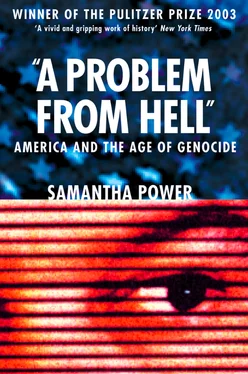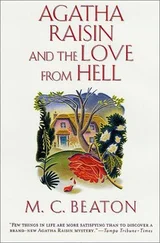The Khmer Rouge did their part, launching an image campaign of sorts. Khieu Samphan replaced Pol Pot as prime minister in December 1979 and invited journalists to hear his version of events. Rejecting charges of genocide, he said, “To talk about systematic murder is odious. If we had really killed at that rate, we would have no one to fight the Vietnamese.” 161Yet now that the evidence of the horrors had surfaced, Samphan could not deny abuse outright. He shrewdly acknowledged some 10, 000 executions under Pol Pot, and admitted “mistakes” and “shortcomings.” Samphan swore that if the KR returned to power, they would not again evacuate the cities, restrict movement and religion, or eliminate currency. In pursuit of U.S. help, he also brushed aside mention of America’s prior sins. “These things are in the past,” he said, referring to Nixon’s invasion of Cambodia, “and should not be brought up.” 162Well aware that it was American hostility toward Vietnam rather than any love of the KR that earned the KR U.S. support, he warned that without U.S. help and with the backing of Moscow, “The Vietnamese will go further—toward the rest of Southeast Asia, the Malacca Strait, toward control of the South Pacific and Indian oceans.” 163He spoke the fashionable language of falling dominoes.
The Carter administration’s policy choice was made easier because at home no voices cried out to supportVietnam. America’s most ardent anti-Communists were still angry at Vietnam for the U.S. defeat. American leftists were mostly disengaged. Die-hard Communists were befuddled by the seemingly sudden division of Southeast Asia into two rival and bitterly contested Communist camps. The mass protests in the United States in the 1960s were a reaction against American imperialism and the loss of American lives. With neither at stake in the 1979 Vietnam-Cambodia conflict, the activists who had once made it to the mainstream did not resurface. The administration was able to reduce its policy calculus to pure geopolitics without rousing dissent.
The issue was not simple. Cambodians themselves were elated to be rid of the KR but opposed to the Vietnamese occupation. The Vietnamese had brought about a liberation from hell, but they did not usher in the freedom for which Cambodians longed. Vietnam’s claims to have invaded simply to stop atrocity and to defend its borders from Cambodian attacks were proven more hollow with the passage of time. Some 200, 000 Vietnamese troops patrolled the Cambodian countryside, and Vietnamese advisers clogged the Cambodian governmental ministries. The Vietnamese-backed regime earned further criticism because of its mishandling of a potential famine. It initially dismissed as Western propaganda reports that Cambodians faced imminent starvation because of disruption of planting and poor cultivation. Then, when outside aid was clearly needed, the regime was more intent on using food as a political weapon than ensuring Cambodians were fed. Kassie Neou, the former English teacher who had long fantasized about rescue, remembers his reaction to the Vietnamese invasion: “My first response was raw. It was a simple, ‘Phew, we survived.’ My second thought, upon understanding that our land was occupied, was, ‘Uh-oh.’ Basically, the Vietnamese saved us from sure death, and they deserved our thanks for that. But years later, we felt like saying, ‘We already said thank you. So why are you still here?’”
Prince Sihanouk, once the nominal leader of the KR front, had been placed under house arrest soon after the KR seized Phnom Penh. In the course of Pol Pot’s rule, he had lost three daughters, two sons, and fifteen grandchildren. Sensing yet another political opening, he emerged from the shadows after the KR’s ouster to criticize both the KR and the Vietnamese. “It is a nightmare,” he said. “The Vietnamese, they are like a man who has a very delicious piece of cake in his mouth—Cambodia—and all that man can do is swallow the cake.” 164For many Cambodians, the occupation by the Vietnamese quickly came to feel like a “liberation” similar to that of Poland by the Soviets after Nazi rule.
A Regime Less “Stinky”?
The UN Credentials Committee, an obscure ninemember body based at UN headquarters in New York, became the unlikely forum for the international debate on what to do about Cambodia. The Credentials Committee routinely met twice a year to determine whether states had the “credentials” to occupy their UN seats. In September 1979, when the committee convened, both the vanquished KR regime and the victorious Vietnamesebacked regime submitted applications. UN delegates from the Communist and non-Communist worlds sparred over which regime should be recognized and which violation of international law was more egregious.
Three layers of geopolitics made it unlikely that the U.S. representative was going to favor stripping the Khmer Rouge of their UN seat. First, of course, the United States was determined not to condone the Vietnamese invasion. Second, it wanted to please China. And third, as a matter of standing policy, the United States wanted the Credentials Committee to remain a pro forma paperwork clearinghouse rather than a political body that would weigh in on the relative “goodness” or “badness” of a regime. If the committee moved away from ritual rubberstamping and began judging the merits and demerits of member states, the United States feared, the committee might next strip UN credentials from Israel.
Robert Rosenstock was the lawyer who represented the United States on the Credentials Committee. The Secretariat tried to select people who would treat the granting of credentials as a technical issue, not a substantive one. They wanted people, he says, who would not “start carrying on if a government was obnoxious.” Rosenstock did not find the Cambodia vote especially difficult:
We at the Credentials Committee…don’t make waves…For us to go against our long-standing mode of operating, somebody in Washington would have had to call us up, and say, “Listen these Khmer Rouge guys really stink and the new guys, the Vietnamese, stink a little less so let’s take away the credentials of the stinkier regime.” That didn’t happen. Washington looked at it as, “They all stink, so let’s support the status quo.”
Rosenstock duly argued that what was at issue was not the conduct of a government toward its own nationals. Since the KR credentials had been accepted at the 1978 session of the General Assembly, they should be accepted again. The committee had a “technical” task to perform and not a political one.
On September 19, 1979, after some heated debate and despite the submission by Congo of a compromise proposal that would have left Cambodia’s UN seat open, the committee voted 6–3 to award UN credentials to the KR regime. The committee did not even review the credentials of the Vietnamese-backed Heng Samrin government. 165
“I was told to engineer the result on the Credentials Committee,” says Rosenstock, “so I engineered the result.” The happiest and most surprised man in New York on the day of the vote was the KR’s Ieng Sary. 166He came bounding up to Rosenstock after the tally and extended his hand. “Thank you so much for everything you have done for us,” Ieng said. Rosenstock instinctively shook the extended hand and then muttered to a colleague, “I think I now know how Pontius Pilate must have felt.”
The battle was not yet won, as the debate over the two regimes’ competing moral and legal claims simply shifted from the Credentials Committee to the General Assembly two days later. Here multiple critics spoke out against the Credentials Committee’s recommendation that the KR regime be recognized. UN delegates, mainly from the Soviet bloc, argued that the KR’s brutality was of such magnitude that they had forfeited their claim to sovereignty. These UN representatives contended that the new regime controlled Cambodia’s territory, represented the people’s will, and therefore earned the rank of legitimate sovereign. Some pointed to the Holocaust. The Grenada representative compared the Vietnamese liberators to the Allied liberators who administered Germany after defeating it. The Soviet and Byelorussian delegates cited the terms of the genocide convention, which they said required withholding recognition from the genocidal regime. Far from deserving to occupy the UN seat, they said, Pol Pot and Ieng Sary, who had fled to the Thai border, should be extradited back to Cambodia to be tried for genocide under the convention.
Читать дальше












